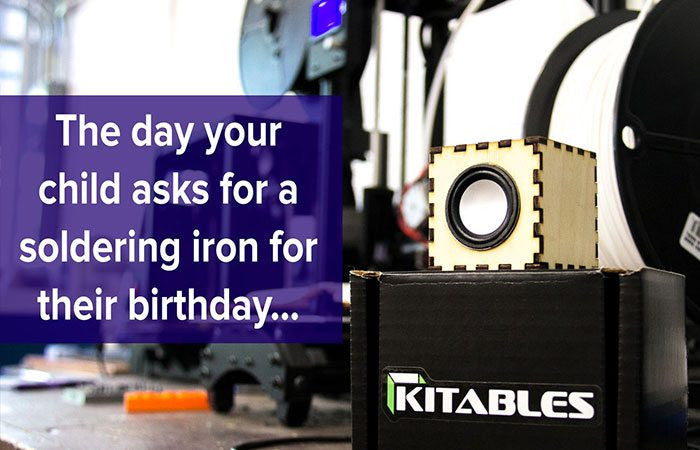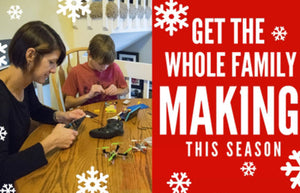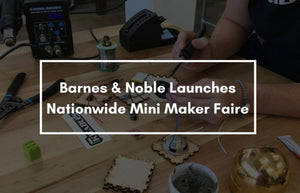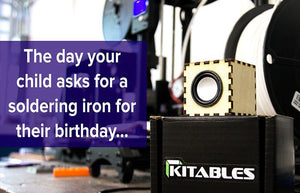The day your child asks for a soldering iron for their birthday.
A maker is someone who designs, builds, hacks, improves and tinkers with physical objects in the pursuit of making. By definition, we are all makers; when you bake a cake you are making, when you build a birdhouse you are making, when you construct something out of Legos you are making, when you fold a paper airplane you are making…the list goes on and on. The maker movement has a public facing perception of just 3D printers and robotics but those are just subgroups of the movement as a whole. If your child begins showing interest in 3D printers, drones, DIY electronics, tools, microcontrollers, microcomputers, amateur science equipment, building their own music instruments, building small vehicles, etc you might have a maker on your hands!
For a deeper dive, a 2014 documentary was released about the maker movement entitled “Maker.” Here is the trailer for just a peek into more of the movement:
Now that you have a bit more of a background on what a maker is, back to the original question:
Should I be worried that my child is becoming a maker?
Short answer, absolutely not!
And here is why. A quick glance at a maker and you might apply the following labels to that person: inventor, engineer, or entrepreneur. Pretty good labels to have! A longer look and you will see that a maker has acquired skills and knowledge that will not only with be beneficial in their hobbies but also in their future careers. Skills such as basic building, electrical engineering, computer science and technology manipulation are just a few.
So pretty quickly you can jump on board now, you’re even excited that you’re raising a maker. Now, how do you support them and also get involved with their new interests?
First off, they will need access to education resources. We suggest to all newcomers that they add these 5 websites to their bookmarks bar, as they are great resources and places you will find yourself visiting often to learn more about making:
Youtube (hundreds of channels focusing on all kinds of making)
They will also needs supplies and tools to get them going on a path to success. For their first few projects they may just need things you can find around the house, but if you really want to deck out their arsenal we would recommend:
• A Soldering Set Up (iron, solder, flux, helping hand)
• Wire Cutters
• Hot Glue Gun
• Multimeter
• Double Ended Alligator Clips
• Calipers,
• Ruler (metric and english)
• Small Screw Driver Set
• Bread Board
• Set of Miscellaneous Wires & Resistors & Battery/Power Sources
Finally, one of the best ways to support them is by encouraging them and providing them a way to get involved in the maker community. As a parent in today’s internet and social media powered world you have probably seen kids who get lost in the world of online and never leave their computer screen or seem to be addicted to their smart phone. They’ve created their entire social life online, rarely venturing out into the world. While the maker movement definitely has online communities and plenty of resources online, the maker community is not one to shy away from face-to-face community events. From local makerspaces to meetup events to maker faires the maker community often meets to share ideas and projects.
You can find Maker Faires using the map search here:
You can find Maker Camps using this map:
You can find local makerspaces with a basic Google search for “makerspace + your town name”
Another great resource to find communities is Meetup.com which has meet up groups for everything, literally! There may be a more focused group in your area that includes your child’s specific interests.
We would highly recommend not only supporting your child’s interest in making but also get involved with it. Building projects with them or attending maker events is an easy and fun way to stay involved. Also with Mom or Dad’s help in projects young makers can usually build bigger and better things. Sometimes a young maker is limited in their building projects if certain tools are “off limits” for their use. The helping hand of an adult will not only expand their capabilities but will also help them grow as a maker.
Your child’s new found love for tinkering is not just going to be beneficial for their maker projects but will also be helpful around the house. As your child works on more and more maker projects they will continue to have a greater understanding for how things work; which will translate well when technical things need to be set up, assembled and fixed when broken. No more calling tech support or paying for in-home installations. Your child will soon be able to instal even the most advanced home theater sound systems, fix the vacuum when it the brush roller on the bottom mysteriously stops spinning, become your new tech support hotline with the WIFI in your home is not working and more! This new “hobby” will save your household time and money.
BUT, there is also a but, you might say “this all sounds too good to be true, what is the bad part about my child pursuing the maker movement as the next thing they are in to?” Ok, you caught us, there is some negatives!. Here are a few things you should be worried about with a new amateur maker in the house.

- You might find that your child’s number of friends is growing exponentially! They may just have too many Maker Friends, more than the snacks cabinet at your house can handle.
- Start saving money now because becoming a maker at an early age can be a roadmap to a college engineering degree at an elite school.
- You may come home one day and find that your young maker has “borrowed” a few parts and pieces from your home appliances. They will say “I needed a more powerful motor for my RC car and no one uses the blender anymore since Dad’s smoothie kick ended in 2015”
- Finally, we would recommend monitoring any talk of Killer Robots, just to be safe. While your child probably does not have the budget for a battle bot, kids are “resourceful” these days.
Have Fun Making!!!






